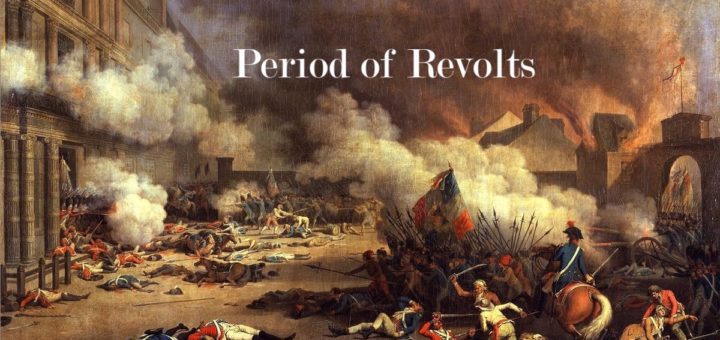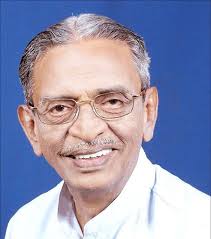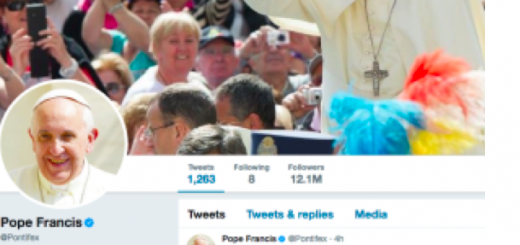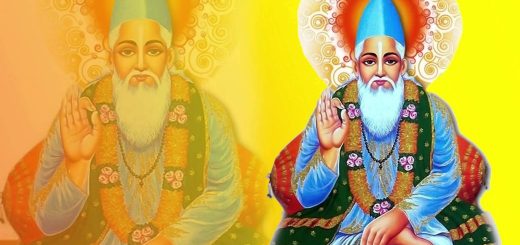Great Revolts in Europe and their impact on the Church!

Varghese Pamplanil
Read a Historical Thriller story by Varghese Pamplanil!
 Note: Another powerful, fascinating, gripping writeup packed with facts historical, precise with names and dates! Hats off to You, Pamplanil, you made me a trained journalist, look like a dwarf beside a giant! Congrats!!
Note: Another powerful, fascinating, gripping writeup packed with facts historical, precise with names and dates! Hats off to You, Pamplanil, you made me a trained journalist, look like a dwarf beside a giant! Congrats!!
Pamplanil's conversation has a touch of continuity as he takes up where others end. He unearths the whole French historical background at his fingertips. He not only quotes from Voltaire, my favourite of Free-press luminary, but imitates him.
Rational to the Core
Coming down to the level of rational humans on earth, to make himself intelligible to them, not those in heaven of whom we know nothing, he questions (following Voltaire) Church doctrines & diktats like “immaculate conception!” Can anyone blame him for that? Isn’t Francis also attacked for similar things?
As for popes, his strongest invectives are against the longest reigned anti-communist, pro-celibate priesthood Pope John Paul II who had “kept a liaison with a married woman under the wraps”. Pamplanil calls him a ‘Humbug’. British journalists described his close relationship with a Polish man’s wife as “more than friendship and less than a love affair” to be polite.
CCV published photos!
 Photos tell more vividly without telling. CCV had published many shocking photos of the ‘love-birds!’, in picnic outfits in US. He has been made a saint! If he can be a saint, who else can’t be a saint in the Catholic Church? Saints should inspire, not “lead us into temptation!” For saints what you need are promoters and money.
Photos tell more vividly without telling. CCV had published many shocking photos of the ‘love-birds!’, in picnic outfits in US. He has been made a saint! If he can be a saint, who else can’t be a saint in the Catholic Church? Saints should inspire, not “lead us into temptation!” For saints what you need are promoters and money.
FROM THE ESTATE OF ANNA-TERESA TYMIENIECKA Image caption: Anna-Teresa Tymieniecka at the time she met Cardinal Wojtyla (Source: BBC News 15 February 2016)

FROM THE ESTATE OF ANNA-TERESA TYMIENIECKA – Cardinal Wojtyla and Anna-Teresa Tymieniecka on a camping trip in 1978 (Source: BBC News 15 February 2016)
Dark light called ‘Faith!’
In this vale of tears we are called to march ahead with the small torch of the ‘fire-fly’ called Reason lighting the path so far and no further! As for the next world, it is for those who hang on to ‘Faith’ which Rahner calls the “Dark Light.” What can you see through darkness? Nothing! Any use for the children of Light? Then follow the light in hand, not in the bush! james kottoor, editor ccv.
Please read below Pamplanil’s Thrilling story-telling all the way!
The French Revolution
The Kerala Church especially the Syro-Malabar outfit is rushing headlong to its disintegration due to the all round moral corruption and financial scandals. Minor children are raped and impregnated callously; hapless nuns are subjected to perverted sex against their will, other hapless women are also sexually exploited and sometimes murdered in cold blood. Hefty dowries in the name of donations are collected for appointments to the educational institutions built up by the sweat and labour of the faithful.but misappropriated by the eclectics. The bishops run fiefdoms as they choose without accountability. Siphoning of church funds is uncommonly common.
History tells us that the filth accumulated in any cess pool is bound to be burst open sweeping away the evildoers for ever. Along with will go the edifice constructed over a period of time. The day of reckoning may not be far off. The great churning in Europe began with the French Revolution.
The French Revolution must be taken not as a single self-contained event, but as the political signature to economic and psychological facts that had accumulated for centuries. Perhaps it began in 1543, when Copernicus published his book “On the Revolutions of the Celestial Orbs”, for then began the twilight of the gods and the liberation of man.
Cast here on this petty earth, no longer the centre of things, but an incident, forced to realise that humanity is an interlude in biology, biology an interlude in geology (as any earthquake will remind us), and geology an interlude in astronomy, man was left to shift and think for himself. Thought became free and boundless and fought its way out of superstition and ecclesiasticism to the time when a whole age would be named after a writer, and Voltaire might say, “I have no sceptre, but I have a pen”.
I never cease admiring the French enlightenment. All in all, I consider it the peak of human history, greater even than Periclean Greece, or Augustan Rome, or Medicean Italy. Never had men thought so bravely, spoken so brilliantly, or lifted themselves to a greater height of culture and courtesy. “Alas!” said Louis XVI standing in his Temple prison before the books of Voltaire and Rousseau, “these are the men that have destroyed France.” Yes they had destroyed one France, but they had liberated another, not to speak of freeing America through their disciples, Washington, Franklin, and Jefferson – (Will Durand – The Greatest Minds and Ideas of all time).
Storming the Bastille
On 14 July 1789, a mob of enraged French peasants attacked the Paris prison called “Bastille” freeing the prisoners and razing it to the ground. The government of France under King Louis XVI was extremely oppressive. Most of the land was owned by the “clergy and nobility”, who also monopolised positions of power in the church, army and government. They were extremely skilful at evading taxes too. Poorest of the poor peasants wore the brunt of the taxes, rents and tithes: exploited mercilessly without any human consideration by the arrogant ruler, privileged clergy and well-healed nobility (“the First Estate”). The ‘have-nots’ constituted more than 95% of the French population and their lives were miserable.
Doesn’t it ring a bell with reference to the position of the “daridra-naryanans-the Aam Admi”: the lumpen proletariat, in the social, political and economic spheres of India, in the Christian Church too, especially in the Zero Malabar church? Will a coolie or water drawer be invited to any bishop’s dining table? The affluent fat cats smelling top-notch foreign liquor, the telltale smell overwhelmed by the applying of imported deodorants alone are welcomed into the inner courts of the bishops and other top cats. Giggling well endowed madams and their nubile daughters, worth ogling at and salivating, are always preferred. Nothing to gain from “atthazha pattinikkar”; so they are out and “kanamarayath”.
Is the Caucasian with blue eyes and trimmed flowing blond hair combed stylishly, painted by some gifted artist, Jesus of Nazareth? The face reconstructed by a Cambridge scientist could be the real face of the Galilean Jesus. Let it be. If an ill-clad, unwashed, hungry looking Jesus, babbling some unintelligible strange language encounter the present day Sadducees, their treatment of him will not be limited to his whipping and thereafter forcing him to carry the wooden beam for his own hanging. He will be tortured at the rake, pulled by the pulley and quartered alive, his writhing body with whatever remnant life throbbing, will eventually be hanged publicly for all to see and the dead body kept exposed for days to be scavenged by carrion birds to the bones. Thereafter his skeleton will be burned to ashes and scattered to the winds to obliterate even his memory, as the church did to Jan Huss. Make no mistake about it. It happened in plenty in Catholic Church in the not so distant time, the latest to my knowledge was Giordano Bruno, Italian philosopher, Dominican monk who was burned alive at the stake (1600 CE) for refusal to recant his firmly held view that there is no “absolute truth” and defending Copernican hypothesis.
The Role of French thinkers
It was Voltaire who introduced to France the mechanics of Newton and the psychology of Locke, and thereby began the great age of the Enlightenment…..included among the supreme thinkers of mankind; …his influence was immoral and destructive…Granted that Voltaire, like Bacon, “lighted his candle at every man’s torch”; it remains that he made the torch burn so brightly that it enlightened all mankind. Things came to him obscure, and he cleaned and scoured them with clarity; things came to him in useless scholastic dress, and he clothed in such language that the whole world could understand and profit from them. Never did one man teach so many, or with such irresistible artistry. …shall we …reject the laughing philosopher of Ferny because his thoughts were different from our own? Evidently we must ask of Voltaire, not do, we accept his conclusions, but did the world accept them, did his thinking mould the educated humanity of his age and posterity?
It did, there can be no doubt of it.. But just as physiological decay leads to no action unless it sends its message of pain to consciousness, so the economic and political corruption of Bourbon France might have proceeded to utter national disintegration had not virile pens brought home the state of affairs to the conscience and consciousness of their country. And in that great task Voltaire was commander-in-chief; all the rest willingly acknowledged his lead, and did his bidding proudly. Even the mighty Fredrick greeted him as “the finest genius that the ages have borne”.
“Beneath the recrudescence of ancient beliefs amid which we live, the influence of Voltaire quietly persists. As all Europe in his century bowed to the sceptre of his pen, so the great leaders of the mind in later years honoured him as the fountainhead of intellectual enlightenment of our time. When we forget to honour Voltaire we shall be unworthy of freedom” (Will Durand ibid).
Other French thinkers, particularly Denis Diderot, Jean Jaques Rousseau highlighted the ills of the then existing unjust system and called for remedial steps. Their writings did fan the fires of discontent. But epoch making events changing the social, political and economic contours of France and later the entire Europe, came through for more practical reasons than the philosophers’ writings.
The onset of the Revolution
In August 1790 came the declaration of the ”Rights of Man”. Local government bodies were reorganised by creating 83 new administrative areas called Departments. Church lands were taken into public ownership. The Church was administered a heavy blow with the enactment of Civil Constitution of the Clergy in 1790. Diocesan boundaries were redrawn to align with the newly-constituted political departments. The number of bishops was truncated from 140 to 83. Bishops and priests were to be elected by the people. Clergymen were compelled to swear allegiance to the French Constitution rather than to the Pope. With the conferring of authority to the general church, the influence of the Pope in the affairs of the French church was curtailed in 1790.
The Triumph of Reason
During the early phase of the Revolution, the Jacobins demanded “freedom and justice for the masses”. The leaders included Jean Marat, George Jaques Danton and Maximilian Robespierre. With a rag-tag army of peasants they, who called themselves “federates”, marched to Paris in 1792. Nobles and clergy who opposed the Revolution were summarily executed. King Louis XVI was guillotined on 21 January 1793.
On 10 November 1793, a group of deputies marched to Notre Dame Cathedral and enthroned a dancer of doubtful morals as the Goddess of Reason.
The years 1793-94 witnessed the Reign of Terror which devoured the instigator, Robespierre; later on the mad fervour of the Revolution subsided. But France remained ungovernable until Napoleon (1769-1821) took control in 1795.
Emasculation of the Church
The relationship between France and the church would deteriorate since 1793. The sovereign state asserted its suzerainty over the Church by initiating several steps such as appointment of clergy, trimming the wings of the pope etc. The French clergy were to receive regular stipend from the state. Although the pope was to appoint bishops, the state could veto appointment of lower clergy made by the bishops.
In December 1804 Pope Pious VII sat as a pathetic spectator while Napoleon crowned himself Emperor. Shortly after becoming Emperor, Napoleon embarked on an ambitious programme of conquest. In 1808 he annexed the Vatican states; deported Pope Pious VII to Savona in the following year. The pope was finally exiled to Fontainebleau near Paris. He was not restored until 1814.
When the pope returned to Rome in 1814, the Jesuit order, suspended in 1773 by Pope Clement XIV, was restored quickly. (The Jesuits had justified the concentration of wealth with aristocracy of France). They had previously been expelled from Portugal, France and Spain too.
Writing in 1763, under the pseudonym of “Justininus Febronius” the bishop of Trier, J. N. von Hontheim (1730-88) argued that the keys to the Kingdom had been committed to the entire church, not only to Peter and his successors. The church councils, not the pope, were the primary source of authority, the pope being in fact only first amongst equals.
Back to the old days
The Congress of Vienna convened in 1815 by the European powers which defeated Napoleon, restored most of the previous rulers in natural units with boundaries as they had been before Napoleon’s campaigns.
After the defeat of Napoleon conservative reaction was revived with a vengeance in Europe, south and north. Pope Gregory XVI (1765-1746) steadfastly opposed Risorgimento, for he feared the loss of his temporal power in Papal States.
Papacy asserts
In 1946 Giovanni Maria Mastai Ferrretti (1792-1878), the fourth son of a count, was elected Pope Pious IX . In 1848 Mazzini supported by Giuseppe Garibaldi (1807-82) and his army conquered Rome. The pope was forced to flee the Eternal City, in disguise to Gaeta near Naples; his liberalism vanished. The French and the Austrians restored him to Rome in 1850.
The Pope struggled with revolutionary republicans most of his life. In 1870, the triumphant King Victor Emmanuel sized the city of Rome. A year later the King deprived the pope of church lands by the Law of Guarantees. Of the once extensive papal holdings only the Vatican, Lateran and Castle Gandolfo remained with the pope.
With a vengeance, Pious IX strengthened the position of the papacy, reasserted the doctrinal position of the church. His approach was to concentrate all powers of the Roman Catholic Church in the papacy (Ultramontanism).
In 1854 Pious IX declared the immaculate conception of Virgin Mary. According to this dogma the Virgin was purified from original sin before her birth. (What a ridiculous dogma: no contribution for her birth by the sperm of her biological father? Was she not delivered through her mother’s birth canal: the vagina? The ever stock answer of the credulous: “God can do anything, even the impossible? But why reduce the Christian god to the level of an imbecile, a joker (“komali”)?
The pope issued the Syllabus of Errors in 1864. This list of heresies and the obscurantist steps were his main weapons against political liberalism, democratic ideas, rationalism in theology and anti-clericalism.
The pope strongly attacked the separation of church and the state fearing the strength of republicanism in France. The Syllabus of Errors also prohibited civil marriages and liberal Catholicism, popularised by French man Lamennais. In response, France prohibited the publication of the Syllabus of Errors.
On the eve of his political undoing, Pious IX summoned the first Vatican Council (1989-70). The pope had already taken steps to strengthen his hands by re-establishing Catholic hierarchies in England (1850), the Netherlands (1853). He had also concluded favourable agreements (concodarts) with Russia (1847), Spain (1851), and Austria (1855).
At the Council, the pope came out with his trump card: “papal infallibility” i.e. when speaking ex cathedra on faith, the pope cannot error. The pope played the game astutely making sure all the cards in his sleeve; 276 Italian bishops against 265 from all other European countries thus a built in majority for Ultramontanism.
Pious IX enthroned tradition with a vengeance. He is stated to have thundered “Tradition; I am tradition”. It wasn’t surprising; a count by birth, the arrogance of his class! Vatican-I sought primary authority within the Roman Catholic Church but failed to avert the great damage caused by the onslaught of modern thought.
Revival of Secularism
In 1870 Napoleon III withdrew from Papal States to counter the Prussian threat to France. He was accused of abandoning the pope. Forced to choose between Catholicism and French national interest, he opted for the second.
The emperor promoted secularism and secular education against the stiff opposition of the conservatives. In 1901 the Association Law which defined the legal status of all religious institutions in France, was enacted. Every religious body was required to be registered with the state. No member of an unregistered association was allowed to teach in a French school. Any congregation could be closed simply by government decree. While about 615 congratulations were registered, 215 did not. The Jesuits and Benedictines refused. When Emile Combes became Minister of Religious Affairs, he used the Act to close 13,904 schools by 1904.
In 1905 came the final break between church and state in France. Gallicanism and its philosophical offspring ant-clericalism finally triumphed. The socialist Aristide Briand (1862-1932) introduced the Separation Law which finally repealed the Concodart of 1801. All subsidies to religious institutions were withdrawn. Church buildings became state property but they would be held in trust by “associations for public worship. The law abolished all privileges enjoyed by the Catholic Church. It also introduced complete freedom of worship.
Pious X declared the Separation Law null and void and urged the French Catholics to disobey it. He regarded the associations as ‘heretical” because they assigned equal role to lay people and the clergy in the management of church property. But this papal decree stood no chance of success against Georges Clemenceau (1841-1929), the powerful anticlerical premier of France.
Over to Germany
In 1862 Otto von Bismarck (1815-98) became Chancellor of Prussia. In pursuit of German unity Bismarck initiated the Kulturkamkampf. The pronouncement of papal infallibility by Vatican I disturbed the Prussians further. The dogma was perceived as a serious affront to both Prussian political leaders and Protestant theologians.
The legal status of Catholics in Germany weakened in 1871 when Bismarck abolished the Catholic bureau in the Prussian Ministry of Education and Public Worship. A year later Adalbert Falk, Minister of Public Worship, restricted Roman Catholic influence by expelling the Jesuits from Germany and bringing education wholly under state control.
Falk was also responsible for enacting of the “May Laws’ of 1873 claiming absolute supremacy of the state. The bishop’s powers of discipline, particularly excommunication, were seriously curtailed. A supreme church court appointed by the Emperor was set up. Candidates for ordination were required to study at state universities and pass examinations in literature, history and philosophy. Pope Pious IX vehemently condemned the laws, but they were not modified until 1886-87.
Into the twentieth century
Pope Leo XIII (1878-1903) sixth child of lesser nobility became the pope. He strengthened diplomatic relations with many countries. In his encyclical Rerum Novarum, he pleaded for social reform and trade unionism to ensure proper income for workers.
The liberalism of Leo XIII was short-lived. Pious X (1835-1914), son of a village post man and a seamstress was elected pope in 1903 at the seventh ballot. Adopting as his motto “to restore all things in Christ” Pius made clear from the start, his intention of being a religious, rather than a political pope. He regarded Leo XIII’s policy of appeasing secular governments was wrong and set himself as a defender of the rights of the church. This soon led to diplomatic break with France on 30 July 1904 where the situation was ripe for it with the annulment by the ministry of Emile Combes (1902-05 of the 1801 concordat and the transfer of church properties to lay associations.
Pope Pious denounced (11 February 1906) the Law of Separation, and against the advice of many bishops, did not opt for any compromise settlement. He also equally protested, against the separation of the church and the state in Portugal (1911).Pious was no less intransigent in theological and social fields. He viewed Modernism with alarm. Pious sought to strengthen the use of the liturgy of the church. In 1904 he launched a revival of the Gregorian chant and urged zealous veneration of Virgin Mary. He also revised the brewery of prayers in 1913.
Pope Pious XI (1922-39) Ambrogio Damiano Achille Ratti son of a silk factory manager. He took his motto “Christ’s peace in Christ’s Kingdom” interpreting that church and Christianity should not be isolated from society but be active. He instituted the feast of Christ the King as a counter to contemporary secularism. He quietly eased the tensions arose out of the Modernist debate.
John XXIII (1958-63) – Angelo Giuseppe Roncalli born on 25 November 1882, the third of 13 children in a family of frugal peasant farmers near Bergamo elected pope on 4 November 1958. Warm hearted, unaffectedly simple, in spite of his erudition, attached to his humble origins and always retaining a peasant’s jovial humour, John heralded the winds of change to his office. His most noteworthy achievement was convening of Vatican II. His brief tenure of office stood in the way of removing the accumulated dirt and muck in the church.
The man who put his foot down on progressive thinking in the Church and turned the clock backwards was John Paul II (1978- 2005) born as Karol Wojtyla in Poland and elected pope in 1978. He was the very antithesis of what Pope John stood for and was a diehard conservative and an adamant autocrat. He argued that freedom of conscience cannot be absolute since certain things (e.g. artificial birth control) are inherently evil. He also maintained that women are incapable of receiving holy orders, unprecedented in modern times, banned all discussions on the subject. His style of functioning was to make dramatic, carefully planned spectacular journeys around the world. In that he was impressive, barring occasions where he received cool, sometimes hostile reception, from progressive Catholics. He undertook what he termed “apostolic” journeys.
His visits followed a set pattern with his kissing the ground on arrival (until prevented by physical disability), moving round in a bulletproof “popemoblie”, saying mass before enormous crowds. He delighted in big show piece occasions giving full rein to his skills as an actor. Morris West describes him as “an actor turned Zealot”. In contrast to his progressive comments on social justice, John Paul II dismayed a large number of Catholics, especially in advanced countries, by his severe stance on faith and morals.
The pope with his henchman inquisitor in the Congregation of Faith, presided by “Panzer” Cardinal Josef Ratzinger put in practice the reign of terror. Staring with Hans Kung of Tibingen in 1979, a series of eminent theologians faced inquisitional treatment, had their licence to teach withdrawn. In addition to Hans Kung, they included the French Dominican Jaques Poshier, the terminally ill American C. E. Curran, Belgium’s Edward Schilebeecks, Germany’s Bernhard Haring, Peru’s Gustavo Gutierrez, and the Brazilian Leonardo Boff, all banned from teaching and publishing “unacceptable” views on subjects ranging from papal infallibility, through “liberation theology” to contraception.
The pope, in 1988 excommunicated the ultranationalist Archbishop Lefevere. While warning against, what he perceived as dangerous trends, with missionary zeal and obstinacy, promoted vigorous affirmations of the centrality of the Eucharist, Blessed Virgin Mary in Christian devotion. He sought to consolidate traditional position by appointing conservative bishops to important sees; purged liberal tendencies of the Society of Jesus and gave conservative organisation Opus Dei the rank of personal prelature (1982). But the field in which he aroused most opposition was that of sexuality. He consistently, even fiercely, maintained traditional teaching on marriage, contraception, abortion and homosexuality, pointedly endorsing Paul VI’s Humane Vitae and forbidding the use of condoms even in countries where Aids was rampant – a policy challenged early in 1966 by the French episcopate.
He resolutely opposed proposals to relax the rule of priestly celibacy or consider the ordination of women. Not only did his inflexible moral and theological stance alienate millions of churchmen, but in many countries, not least in Latin America and the USA, the church yielded ground to increasingly popular Protestant sects. The membership of the Catholic Church ceased to grow in relative terms as compared with the rapid growth of Islam, steep decline of Catholic priests, and in some countries, drying up of vocations to priest-hood and religious life.
In his personal life, he seems to have been a humbug – he kept a liaison with a married American woman under the wraps – while shouting from the rooftops the sanctity and inviolability of marriage and tall talks on chastity and sexual restraint. Since he hailed from the communist Poland he would stoop to any level against communists, his bete noir. Insensitive to the real problems faced by the poor and de-possessed of the world, he stuck to an obsolete socially anachronistic paradigm. He was the protector of the notorious womaniser and sexual pervert Mecil of Mexicoby accepting the renegade’s US dollar bribes. History may judge him as the nemesis of the Church.
Epilogue
“Looking to the future, we are likely to see a continuing in support of Christianity in the West, so long as a majority continue embrace the turn to subjective-life. For those who do not, particularly those who value ‘traditional’ forms of community and family life, Christianity may continue to serve as a cultural alternative. In less affluent parts of the world, by contrast, Christianity is likely to enjoy continuing success – unless such countries begin to develop their own versions of a turn to subjective-life.” (“Christianity-A Very Short Introduction”- Linda Woodhead – Senior Lecturer in Christian Studies, Lancaster University.)
(N.B. The source of personal information regarding popes, is mostly from Oxford Dictionary of Popes – Varghese Pamplanil).
This article was originally published on 21 February 2020.

















